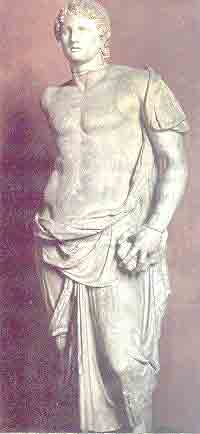People
King Alexander The Great (356-323 B.C.)
King Alexander the Great, Alexander III of Macedon (356-323 B.C.) [Hellenic Post] [100 Drachmas]. Alexander, the most charismatic and heroic King of all times, accomplished greater deeds than any other ruler before or after him. King of Macedonia [Place Names], was born in late July 356 B.C. in Pella {Πέλλα}, Macedonia {Μακεδονία}. He was the greatest military genius in history. He conquered much of what was then the known world, driven by his divine ambition of the world conquest and the creation of a universal world monarchy.
The Empire Of King Alexander The Great

He was a strong, handsome commander with one eye dark as the night and one blue as the sky, always leading his army on his faithful horse Bucephalus {Voukefalas ~ Βουκεφάλας}. Alexander inherited from his father King Philip {Vasilefs Filippos ~ Βασιλεύς Φίλιππος} the best military formation of the time, the Macedonian Phalanx {Makedoniki Falanks ~ Μακεδονική Φάλαγξ}, armed with sarisses {sarissa ~ σάρισσα}; the fearful five and a half meter long lances (18.04 feet).
The Macedonian Phalanx (Image source: P. Connolly, The Greek Armies, 1978)

He was the first great conqueror who reached Greece, Egypt, Asia Minor, and Asia up to western India. He is famous for having created the ethnic fusion of the Macedonians and the Persians. From victory to victory, from triumph to triumph, Alexander created an empire which brought him eternal glory. He brought Greek ideas, culture and life style to the countries which he conquered, and assured expansion and domination of Hellenistic Culture which, together with Roman Civilization and Christianity, constitutes the foundation of what is now called Western Civilization.
Alexander's actions were inspired by one god, one demigod, one hero and one sovereign. Dionysus {Dionisos ~ Διόνυσος}; a divinity. Hercules {Iraklis ~ Ηρακλής}; a demigod. Achilles {Ahilefs ~ Αχιλλεύς}; a hero. Cyrus the Great {Kiros o Megas ~ Κύρος ο Μέγας}; The Persian Emperor. His actions were guided by the sprit of Homer {Omiros ~ Όμηρος} [50 Drachmas], who appeared in Alexander's dreams, while the Iliad {Ilias ~ Ιλιάς} was his manual of war. Like Achilles, Alexander was a superhuman hero and warrior, he exposed himself often to the extreme danger during battle. Like Hercules, Alexander could support pain, hunger, thirst, heat, desperation and great suffering with immense patience. As a boy, his mother introduced him to the cult mysteries of Dionysus. Through Dionysus, Alexander took extreme mobility and love for adventure. Alexander admired the personality of Cyrus the Great, the founder of the Persian Empire, whose example and politics he imitated during the creation of his universal empire. Like Cyrus, Alexander respected the tradition and religion of dominated peoples. The Iliad tought him that he could have only two epic and noble passions: furious anger and disinterested generous friendship. To live with such a multitude of images and multiplicity of souls inside one personality was difficult and dangerous, as such a coexistence was not often harmonious and pacific. Alexander's epic actions were often guided by the ghost of Homer.
Alexander had the iron will and capacity to lead his men; he knew when to withdraw and when to modify and adapt his policy. Alexander had imaginative fantasy of genius which was driven with the strong romantic figures like Achilles, Heracles, and Dionysus. He was sometimes cruel and autocratic. The only clear characteristics that emerge are his outstanding military genius and his successful politics. The only psychologically clear motive is the pursuit of glory was the urge to surpass the heroes of myth and to attain divinity. The success of his ambition, at immense cost in human terms, spread a veneer of Greek culture far into central Asia, which remained present during the Hellenistic {Ellinistiki ~ Ελληνιστική} era for a long time after his death.
His financial policy was centralized with collectors independent of the local governors and the establishment of a new coinage helped trade everywhere, having a strong impact to the economy of the Mediterranean.
Alexander founded over 70 new cities. The Greek influence remained strong and the colonization process was continued by Alexander's successors. The diffusion of Hellenic customs over Asia till India was one of the most dominant effects of Alexander's conquests, but his plans for ethnic fusion, did not have success. The Macedonians rejected the idea of ethnic fusion and in the later Seleucid Kingdom {Vasilion Selefkidon ~ Βασίλειον Σελευκιδών} the Hellenistic element was dominant.
As a conqueror, Alexander is among the greatest the history has seen. He had adapted new tactics and created innovative forms of warfare. His strategy was genial and imaginative and he knew how to use the opportunities that occurred in every battle that were decisive for the victory.
He initiated the era of the Hellenistic monarchies, and created, if not politically, at least economically and culturally, a single market extending from Gibraltar to the Punjab, open to trade, social and cultural exchange. This vast territory had common civilization, and the Greek language was in fact was the lingua franca of the time.
Alexander's expedition brought significant improvements of geography and natural history. His achievements mark a decisive moment in the World history. The Roman Empire, the spread of Christianity as a world religion and the thousand years of Byzantium [Byzantine Emperors] were all part the consequences of Alexander's conquests.
King Alexander the Great, Alexander III of Macedon (356-323 B.C.)

06-15-2004